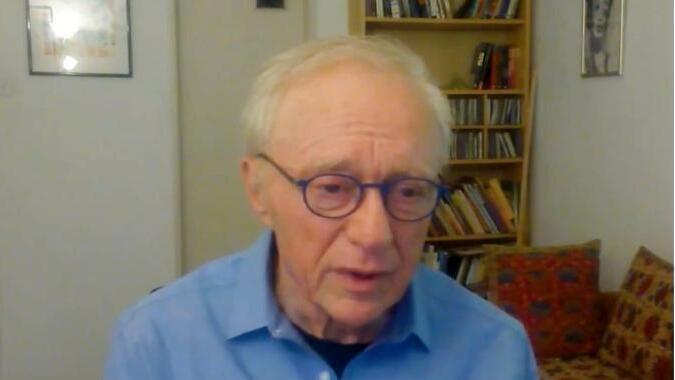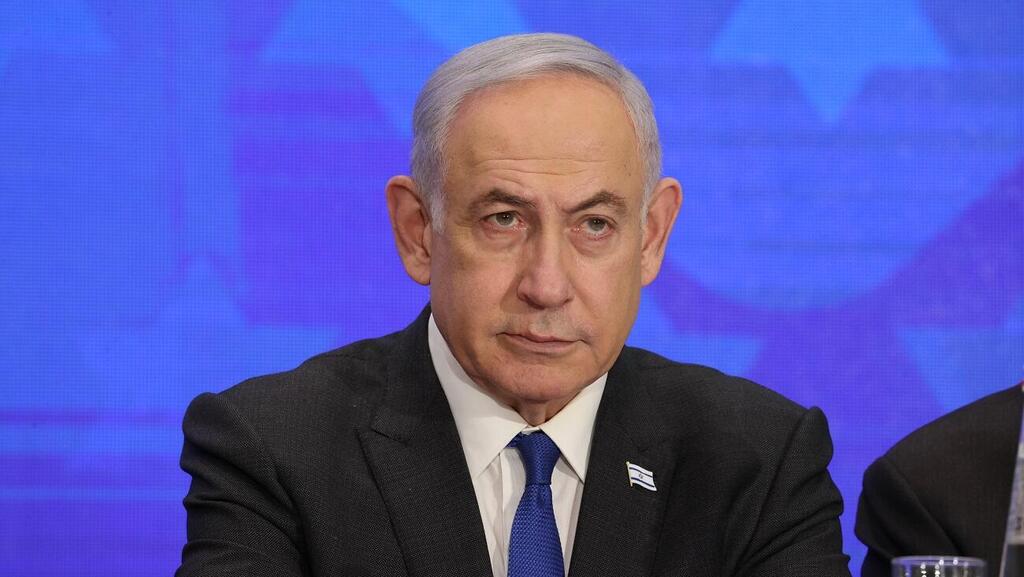Getting your Trinity Audio player ready...
In a livestreamed interview at Manhattan’s 92nd Street Y marking the English-language launch of his new essay collection "The Mind of a Thinking Heart: Essays on Israel and Palestine", Israeli author David Grossman issued unusually sharp criticism of Prime Minister Benjamin Netanyahu, his cabinet and the Israeli right.
Speaking with American author Joshua Cohen, Pulitzer Prize-winning writer of "The Netanyahus", Grossman warned of dire consequences if Netanyahu is found guilty in his ongoing corruption trial.
David Grossman in an interview for NY92
(Video: NY92)
“I’m very afraid of what will happen here if Netanyahu is convicted,” Grossman said. “Violence is already etched so deeply into the Israeli psyche — both national and personal — that the worst may still erupt. We might also see Mr. Netanyahu’s expertise in inflaming situations, creating states of hatred and brutality. He thrives on it — he operates brilliantly in such circumstances.”
Grossman also condemned Netanyahu’s far-right coalition partners, Itamar Ben-Gvir and Bezalel Smotrich:
“I view the normalization of figures like Ben-Gvir and Smotrich — both their personalities and ideologies — as Netanyahu’s gravest sin. It’s a crime, really. Allowing such people so much influence over our future is criminal. They’re fascists, full of hatred and what they’re doing is injecting messages of hatred and fascism again and again.”
He accused the Israeli right of detaching from reality:
“To be right-wing in Israel, you have to disconnect yourself from a large part of reality. And if you insist on denying reality, you have to sacrifice some of your intellectual and emotional faculties.”
Focusing on settlers, Grossman said:
“In order to do what they’re doing — controlling millions of people who don’t want them and have no hope for another life — they have to suppress parts of their intellect and emotion. To not know what you’re doing, to avoid seeing the verdict you’re delivering on our existence here, you must dull the finer, more sensitive parts of your consciousness. For settlers to keep doing what they’re doing, they need to harden themselves, become blunt instruments — less open, less sensitive.”
Grossman painted a grim picture of post-October 7 Israel for the American audience:
“The atmosphere is one of despair, of hopelessness, of a sense of betrayal by a leadership that promised us the best air force and army in the world. Suddenly, we found ourselves shattered to pieces.”
“Yet it will take some decades, and I think until we understand what really had been done to us on this October 7, and the feeling that we treat the reality with language that is consistent, mainly by cliches. We don't have words, we don't have nonsense, we have cliches. And the very usage of cliche is an insult for people who take pride in their sensitivity to the language.”
Get the Ynetnews app on your smartphone: Google Play: https://bit.ly/4eJ37pE | Apple App Store: https://bit.ly/3ZL7iNv
He likened Israel to the biblical Samson, undone by his own power:
“Samson is like a big riddle to himself… He does not understand [his power]. He is doomed, almost, to use extra power to react more excessively and much more than needed when there is the slightest threat to him… We suffer from it—the Israelis—for too many years. You cannot be so strong without making mistakes of strength, without being tempted to your abilities and your potential.”
Despite Israel’s might, Grossman said, military force alone won’t be enough:
“We’re doomed to live by the sword and die by the sword,” but we can’t win alone. “We must have peace with as many Arab countries as possible… We need the Palestinians exactly as they need us.”
'I do not see a better solution'
A longtime supporter of the two-state solution, Grossman expressed doubt it could still be achieved:
“I do not see any better solution... There's too much of bad blood, too much of fanaticism, too much of religion in the conflict to believe that we can overcome our basic primal urges and desires and emotions towards the other... Give me another idea, a better idea, and I might embrace it.”
“And that leads me to the conclusion that the most important component of our peace situation, our situation in the future here, is to have peace with as many as possible [Arab] countries. We need them as they need us. We need the treaties and the allies and the bonds that we can create with as many Arab countries as possible. And for that, we also have to be very sensitive and wise even in our attitude to the Palestinians. We need them. We don’t do them any favor by insisting that they will have a state of their own. We need them exactly as they need us.”
Grossman also addressed the growing trend of Israeli writers and intellectuals leaving Israel:
“It’s painful to see all these brilliant young people leaving Israel. It’s also dangerous, because they could have contributed so much to the country’s future, to shaping its character — and now they’re gone. Maybe they’re right and I’m wrong. But for now, I’m not leaving. I don’t know — maybe reality will one day force me to, but I hope not.”
“I choose to stay, at least for now, because everything that happens here — from the worst to the most beautiful — is relevant to my life. I want to live a relevant life, in a place where nearly everything demands that I be involved, be present, be alive. I want to live where the language is relevant to me, the associations are relevant, the character of the people and their actions—relevant. I understand why people here act the way they do, for better and worse.”
Reflecting on religion and God — especially in the context of his son Uri’s death during the Second Lebanon War in 2006 — Grossman said:
“It was easier for people who believe in God. They had a kind of ‘explanation,’ in quotes. I don’t want comfort from above. I want to stand completely defenseless in the face of this reality. I want to stand naked before it. I’m too perceptive to believe in God.”
He described himself as:
“An atheist, but very, very Jewish. When polls ask whether I feel more Israeli or Jewish, I say: ‘I don’t want to choose.’ To me, being Jewish means being able to live without the help of a higher power guiding or protecting us... I need to be without God — that matters to me.
“I don’t want anyone mediating between me and reality. There’s nothing. Just a barren desert of nothingness, and we have to fill it ourselves—with our values, our abilities, our passions, our humor—everything. It’s up to us to create.
He ended on a pensive note:
“And the future, as the song says, is not ours to see.”








